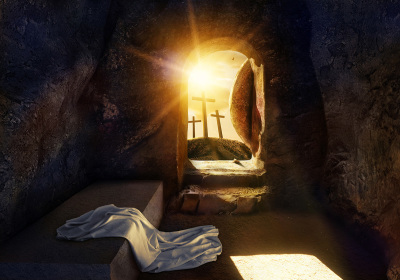The resurrection of Jesus as a pointer to His deity

Unquestionably, Jesus’ resurrection from the dead stands at the very center of the Christian faith, as the Apostle Paul reminded us vigorously in 1 Corinthians 15:11-22. Without it, there is no salvation (verse 17) and our deceased loved ones are without a Christian hope (v. 18). A glorious eternity for those who commit themselves to Jesus Christ’s truth is based on His resurrection.
Astonishing claims are often questioned for a variety of reasons. In this case, the resurrection of Jesus is supported by several historical facts that are accepted by virtually every single credentialed New Testament scholar, even atheist specialists who research this field. For example, there are very few doubts that Jesus died due to Roman crucifixion. Just as well accredited is that these scholars think Jesus’ followers had experiences that utterly convinced them that they had personally seen Him alive after His death. As a result, their lives were totally transformed, and they began reporting these experiences almost immediately.
Critical scholars equally agree that outsiders — James the brother of Jesus and a former unbeliever, and the Jewish Pharisee Saul of Tarsus (later the Apostle Paul) — also became believers when they likewise were totally convinced that they, too, saw the risen Jesus. Most of these researchers even agree that the place where Jesus was buried was discovered empty shortly afterward.
If the historical evidence is so strong, then why don’t more scholars who recognize these facts become believers? Researchers also agree that a person’s beliefs about the world, life, and what is most meaningful to them — basically our worldviews — very frequently outweigh and overpower what we think about ultimate reality. We will often disvalue what we think even about strong arguments in light of our own personal views.
There are over 300 verses on Jesus’ resurrection in the New Testament. In these passages, this event is related to almost every major Christian doctrine and many areas of Christian practice. More than any other theological truth, Jesus being raised is linked to the resurrection of believers (John 14:19; 2 Corinthians 4:14; Philippians 3:21; 1 John 3:2).
Another wonderful comparison occurs when the resurrection is connected to the deity of Jesus Christ. As such, Scripture ties the greatest event in history to one of the indispensable essentials of the Gospel data — God’s side of the plan of salvation. At a minimum, the Gospel requirements involve the deity, death, and resurrection of Jesus Christ, which is the basis upon which believers commit their lives to God.
So this connection is also a central one. It is argued in the New Testament that Jesus’ deity was shown to be true because of His resurrection. This is an exceptionally powerful argument. This combination appears in many passages, some being early creedal texts that were developed just a few years after the crucifixion, like Romans 1:3-4, where it is contended that Jesus’ deity followed from the truth of the resurrection. Another glorious example is Romans 10:9, where Paul actually linked Jesus’ deity to the resurrection by making it clear that “Lord” in 10:9 means YHWH in 10:13, where Paul cited Joel 2:32 to finish that connection. Can it be stated more powerfully? One of the clearest times Jesus is addressed as God in the New Testament is when unbelieving Thomas witnessed an appearance of the risen Christ and responded by calling Him God (John 20:24-29).
Perhaps think of it this way: after Jesus was dead, His Father got involved and raised Him. But the Old Testament made it clear that a false prophet is not from the Lord (Deuteronomy 18:21; Jeremiah 28:9). Neither is a false teacher, even if he performs miracles (Deuteronomy 13:1-3).
Jesus both made predictions and performed miracles. If Jesus were a false prophet, would God have raised Him? But the stakes couldn’t be any higher because God will not share His glory with another (Isaiah 42:8). By raising Him from the dead, God showed that Jesus spoke the truth. It couldn’t have been any other way because only God can raise the dead.
Originally published at Liberty Journal.
Gary Habermas, Ph.D., is a Distinguished Research Professor at Liberty’s John W. Rawlings School of Divinity, where he teaches in the Ph.D. program. A highly regarded Christian apologist, Habermas has published 48 books, many on Jesus’ resurrection. He has also written on near death experiences, doubt, and suffering. He has over 85 contributions in other books and almost 200 articles and reviews published with Oxford, Cambridge, Blackwell, Harper, Dell, Fortress, Baker, IVP, and Zondervan. He has taught at Liberty for 41 years.





















